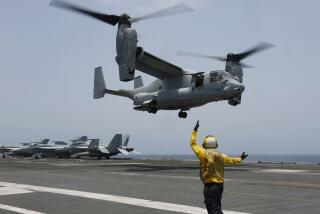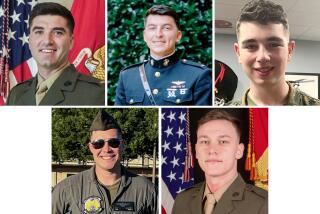Murder Charges Likely for Marines in Iraq Death
- Share via
SAN DIEGO — The Marine Corps will file criminal charges, including some murder counts, against several enlisted Marines and a Navy corpsman in the fatal shooting of an Iraqi civilian in April, officials close to the investigation said Thursday.
The Marines and the corpsman were brought back to Camp Pendleton in recent weeks as the Naval Criminal Investigative Service looked into the April 26 shooting of a man in Hamandiya.
The troops, with the 3rd Battalion, 5th Marine Regiment, 1st Marine Division, may also have attempted a cover-up by planting evidence near the body to suggest that the man was an armed insurgent digging a hole to plant a roadside bomb.
The decision to file charges comes amid two investigations of allegations in a separate case that Marines killed at least 24 Iraqi civilians, including women and children, Nov. 19 in Haditha, west of Baghdad.
An administrative investigation headed by a two-star Army general has concluded in the Haditha case that the Marines killed the civilians without provocation, some execution- style, and then lied to cover up their conduct. A separate investigation of the incident could lead to criminal charges, including murder and dereliction of duty counts.
Murder charges in the Hamandiya case would be the first brought against Marines based at Camp Pendleton in the death of an Iraqi.
Commenting on the case this week on ABC television, Rep. John P. Murtha (D-Pa.), a retired Marine colonel and decorated Vietnam veteran, said that “some Marines pulled somebody out of a house, put them next to an [improvised explosive device], fired some [AK-47s] so they’d have cartridges there. And then tried to cover that up.”
Besides the murder counts, the charges are expected to include conspiracy. Under the military system, the charges will go to a proceeding called an Article 32, akin to a preliminary hearing.
A hearing officer will then recommend to the commanding general whether the case should go to a court-martial. The commanding general can reject the recommendation.
When the Hamandiya charges will be filed is unclear. A spokesman at Camp Pendleton would say only that “the investigation is still ongoing and no charges have been preferred.”
The officials who spoke about the case asked for anonymity because they had not been authorized to speak publicly.
More than a dozen Marines are in the brig or restricted to the base as part of the Hamandiya investigation, although only eight are expected to be charged.
Keeping Marines who are under investigation in the brig is unusual, suggesting that the Corps is concerned the suspects may try to flee. Marines involved in the Haditha case are at Camp Pendleton but are not in the brig.
Marine brass have been briefing key members of Congress on the investigations in the Haditha and Hamandiya incidents.
Both involve Camp Pendleton Marines, but those in Haditha were with the 3rd Battalion, 1st Regiment, 1st Marine Division. The battalion was on its third deployment to Iraq when the killings occurred.
Although no Marines have been charged with murdering an Iraqi, a major and a sergeant were convicted in 2004 of lesser charges stemming from the June 2003 death of an Iraqi prisoner at a detention camp near Nasiriya. The prisoner was reputed to have ties to Saddam Hussein’s Baath Party and was suspected of complicity in the ambush of a U.S. convoy.
The major was convicted of maltreatment of prisoners and dereliction of duty; the sergeant was convicted of assault and dereliction. Neither was sentenced to the brig.
Army personnel in Iraq have been embroiled in similar investigations, some involving murder charges, but none of the cases has received as much notoriety as Haditha. One reason may be the presence of incriminating photos and videos of the Haditha victims, taken by Iraqis and Marines. Also, that case appears to involve at least a low-level cover-up.
One of the main objects of the administrative Army investigation is to determine whether the cover-up extends beyond the Marines on the scene to high-ranking officers who knew, or should have known, that the troops’ original report that the Iraqis were killed in crossfire or by an insurgent bomb was false.
Marine Commandant Gen. Michael Hagee went to Iraq last week to lecture troops on the need to follow the Geneva Convention and other rules of warfare concerning noncombatants.
Hagee praised the “99.9%” of Marines who follow their training not to fire on civilians. He plans similar visits to Camp Pendleton and other stateside bases.
The Haditha investigation focused on a dozen Marines.
Three or four are considered to have fired the fatal shots and may be charged with murder. A similar number may have failed to stop the shootings or helped file a false report to superiors. The others may have been too far away to be involved, officials familiar with the inquiry said.
Three officers with the Haditha battalion were relieved of duty in April by Maj. Gen. Richard Natonski, commanding general of the 1st Marine Division. Natonski said only that he had “lost confidence” in their leadership.
Lt. Col. Jeffrey Chessani, the battalion commander of the three-five, and Capt. Luke McConnell, commander of Kilo Company, are being scrutinized under the military doctrine of “command responsibility,” in which a commander can be held accountable for the actions of subordinates even if he knew nothing about those actions.
Capt. James Kimber, commander of India Company, was relieved because of disputes unrelated to Haditha, according to his attorney and officials close to the investigation. Kimber and his family are reacting angrily to his name being mentioned in connection with the killings.
“He was caught up in this, and he was thrown in [by the commanding general] because they needed another head,” said Kimber’s father, Richard, of Gaithersburg, Md. “This has ruined his Marine career, and it’s very unfair.”
Although the Haditha and Hamandiya incidents appear to involve similar accusations, the cases have been treated differently.
Only after Time magazine began investigating the Haditha case in January and February did the Marine Corps back off from its assertion that the Iraqis had been killed in crossfire or by an insurgent bomb.
But in the Hamandiya case, an investigation was begun more promptly. Maj. Gen. Richard Zilmer, the top Marine in Iraq, took the unusual step last month of issuing a statement that “sufficient information existed to recommend a criminal investigation.”
Marine brass are worried that the incidents could harm the Corps’ reputation and further erode public support for the U.S. mission in Iraq. With that in mind, the Marine Corps has promised to make the Army’s administrative investigation of the Haditha killings public as soon as possible.
“This is bad,” said one senior officer. “We’ve got to keep it from being worse.”
In another allegation of misconduct by U.S. forces, the BBC on Thursday aired videotape that it said supported the Iraqi version of disputed killings near the city of Balad in March.
The U.S. account says troops seeking a suspected insurgent attacked a house, killing the man as well as two women and a child who were inside.
But Iraqi witnesses, including police officers, told The Times the day of the incident that troops had entered the house, hog-tied 11 residents and shot them through the head.
The BBC did not air most of the videotape, saying the images were too grisly to be shown.
U.S. officials told the BBC that the incident was under investigation.
More to Read
Sign up for Essential California
The most important California stories and recommendations in your inbox every morning.
You may occasionally receive promotional content from the Los Angeles Times.










